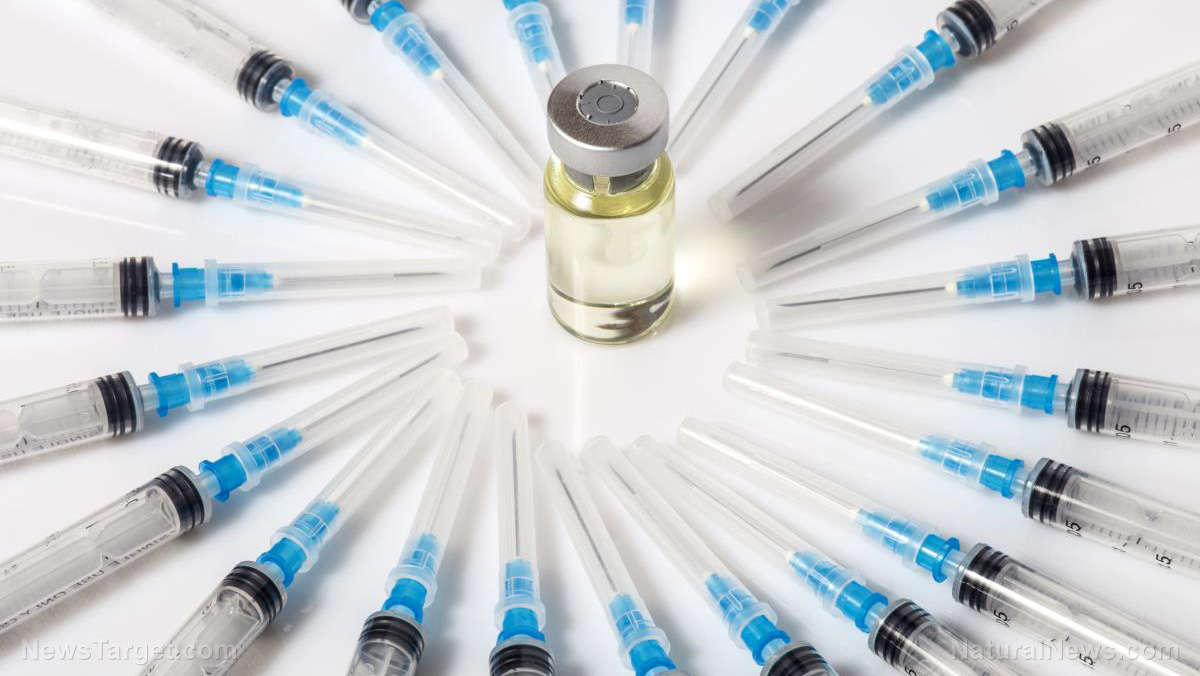HK experts: BioNTech Covid vaccine 32 times LESS effective against omicron
12/14/2021 / By Ramon Tomey

Researchers from Hong Kong found that the BNT162b2 Wuhan coronavirus (COVID-19) vaccine is less effective against the B11529 omicron strain. They found that the new variant reduced the mRNA vaccine-induced antibodies by at least 32-fold.
Scientists from the University of Hong Kong (HKU) and Chinese University of Hong Kong (CUHK) examined the BNT162b2 mRNA vaccine developed by German company BioNTech. The firm partnered with mainland Chinese drug manufacturer Fosun Pharma to distribute the mRNA shot in China and surrounding areas – including Hong Kong, Macau and Taiwan.
BioNTech partnered with Pfizer to handle vaccine distribution outside of China.
The researchers from the two universities published their findings about the vaccine on Dec. 12. They found that the omicron variant reduced the vaccine-induced antibodies by at least 32 times. They discovered this issue based on blood analysis from 10 people who got the two-dose vaccine in November 2021.
The neutralizing antibodies induced by the mRNA vaccine had dropped from 320 units to a mere 10 units for the omicron strain. At least 25 units are needed to confer protection against infection.
HKU virologist Malik Peiris said: “We can see most individuals had high level of virus-killing activity against the original SARS-CoV-2 [strain], but this ability was markedly reduced by 32-fold or more against the omicron variant.”
The researchers pointed out that additional research is needed to know more about how the mutations on the omicron variant’s spike protein – which the virus uses to enter human cells – affected its sensitivity to vaccines. The B11529 strain reportedly possessed more than 35 mutations on its spike protein alone.
They thus called on the elderly, immunocompromised and those with comorbidities to get injected with the booster shots at the soonest. Boosters raised the vaccine’s effectiveness to 75.5 percent, the experts said.
“It will be important for those who are at higher risk, including older age and those with immuno-compromised conditions or other chronic diseases – such as diabetes and high blood pressure – to take booster doses of vaccine as soon as possible,” Peiris said.
David Hui Shu-cheong, CUHK respiratory expert and pandemic adviser to the special administrative region, said: “We expect that vaccines may still have a protective effect against severe disease and death. It is therefore important that all those who are eligible for vaccination get fully vaccinated.”
Israel also finds BioNTech mRNA vaccine less effective
A study conducted in Israel also found that the standard two doses of the mRNA vaccine was less effective against the omicron strain. The Middle Eastern country made use of the BioNTech mRNA vaccine, this time distributed by Pfizer, to vaccinate its population.
Israelis who received the initial two-dose Pfizer vaccine six months ago or earlier have “almost no neutralizing ability” against omicron. This was the finding of a study conducted by physician Dr. Gili Regev Yochay of Sheba Medical Center in Tel Aviv. While her study was small – only involving 40 health workers in the hospital – Yochay said its results are reliable and significant. The physician compared 20 blood samples from individuals injected with the Pfizer booster dose and 20 other samples from those who did not get the booster.
“People who received the second dose five or six months ago have almost no neutralization ability against omicron – and that’s very worrisome. The fact that omicron is somewhat resistant to the vaccine is very much apparent when you’re only with two doses, and much less substantive after a third dose,” Yochay said during a Dec. 11 media briefing. (Related: Israel flipping out over spread of new “Omicron” covid strain – vaccines and “boosters” proving to be medically useless.)
Yochay’s findings came five months after the Israeli Ministry of Health‘s (MOH) discovery that the Pfizer vaccine’s effectiveness dropped by more than half against the B16172 delta variant. A July 22, 2021 report by the MOH revealed that the Pfizer mRNA vaccine was only 39 percent effective against delta.
The ministry based its finding on COVID-19 cases reported between June 20 and July 17 – which coincides with the spread of the delta variant in the country. Furthermore, the July 22 paper from the MOH showed the decreasing effectiveness of the two-dose mRNA vaccine in preventing transmission.
Another Israeli study from April 2021 showed that the Pfizer vaccine made Israelis more susceptible to catching certain SARS-CoV-2 variants instead of protecting against them. The study by researchers from Tel Aviv University and Clalit Health Services examined the COVID-19 test results of 800 Israelis. Half of the results came from vaccinated people, while the other half were from unvaccinated ones.
They found the B1351 beta strain to be eight times more prevalent in those who complete the two doses of the COVID-19 vaccine. Meanwhile, the B117 alpha strain was more prevalent in those who get injected with one dose of the Pfizer vaccine. (Related: South African B1351 coronavirus variant affects vaccinated patients more easily than the unvaccinated, warn Israeli researchers.)
Lead researcher Dr. Adi Stern said: “We found a disproportionately higher rate of the [B1351 beta] variant among people vaccinated with a second dose, compared to the unvaccinated group. This means that the [B1351] variant is able, to some extent, to break through the vaccine’s protection. Based on the patterns in the general population, we would have expected just one case of the [beta] variant, but we saw eight.”
BadMedicine.news has more about COVID-19 vaccines being less effective against SARS-CoV-2 variants.
Sources include:
Tagged Under: Big Pharma, BioNTech, coronavirus vaccine, covid-19 pandemic, discoveries, immune system, infections, mRNA vaccine, neutralizing antibodies, omicron, omicron variant, outbreak, Pfizer, pharmaceutical fraud, research, vaccine effectiveness
RECENT NEWS & ARTICLES
COPYRIGHT © 2017 IMMUNIZATION NEWS




















